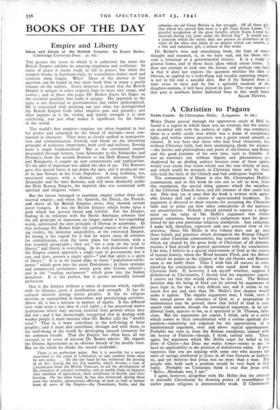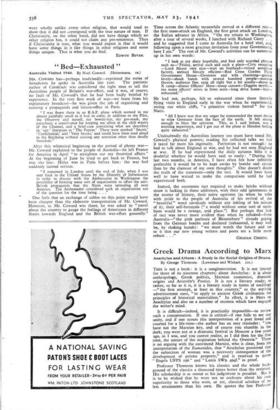A Christian to Pagans
Noble Castle. By Christopher Hollis. (Longmans. 8s. 6d.) WHEN Dante passed through the uppermost circle of Hell he found it a region in which there was no torment, but the eternal
air trembled only with the sadness of sighs. He was conducted there to a noble castle over which was a dome of exceptional light, and within whose precincts was a green sward smooth as enamel. It was here that those who had lived virtuously, but without Christian faith, had their unchanging abode for eternity —the heroes and philosophers and poets of old Greece and Rome and the good paynims of his own time, such as Saladin. It was an existence not without dignity and pleasantness, yet shadowed by an abiding sadness because none of these spirits
would ever attain that vision which was the true felicity of man, and which could be attained, in Christian times only by those who held the faith of the Church and had undergone baptism.
The communion of Dante is also Mr. Christopher Hollis's communion, and in this book he sets out to tell us how, from this standpoint, the special thing appears which the members of the Christian Church have, and the inmates of that castle had not. One may say at once that the book is written with agree- able literary skill and a charm of open-minded frankness. Its argument is directed to show reasons for accepting the Christian faith and to point out how other conceptions of the universe are unsatisfactory. Nobody should pretend to express a judge- ment on the value of Mr. Hollis's argument that claims general consensus, because a critic's Judgement must be deter- mined by his own particular religious standpoint. Any criticisms I make will, therefore, represent only one personal view of the universe. Since Mr. Hollis in this volume does not go into those beliefs and practices which distinguish the Roman Church from other Christian communions, but contends only for beliefs which are shared by the great body of Christians of all denomi- nations, I find Myself in general agreement with his conclusions. Like him, I believe in a special intervention of God in the course of human history, when the Word became Flesh, and the defects to which he points in the religion of the old Greeks and Romans seem to me really there. Thus I wish him all success in com- mending his conclusions to those who stand aloof from the Christian faith. If, however, I ask myself whether, suppose I disbelieved in Christianity, I should find his arguments cogent, I cannot say that this would always be the case. The Roman doctrine that the being of God can be proved by arguments of pure logic is, for me, a very difficult one, and it seems to me much less pat and easy than Mr. Hollis's first chapter would make it appear. The regular arguments may, I think, even if they cannot prove the existence of God, as a proposition in mathematics may be proved, show that belief in God is con- sonant with reason, though the ontological argument, in its tra- ditional form, appears to me, as it appeared to St. Thomas, falla- cious. But the arguments are cogent, I think, only to a mind which comes to their consideration with a certain spiritual dis- position—something not required for the appreciation of a mathematical argument, over and above logical apprehension. Probably my view is, from the Roman standpoint, tainted with the heresy of Fideism—though, I think, tainted only. Then, again, the argument which Mr. Hollis urges for belief in the deity of Christ—Aut Deus aut malus homo—seems to me to have no applicability to the position of disbelievers today. It pre- supposes that you are arguing with some one who accepts the mass of sayings attributed to Jesus in all four Gospels as authen- tic, and yet believes that Jesus was no more than a man. But people who hold such a position would be very hard to find today. Probably no Unitarians think it true that Jesus said. "Before Abraham was, I am."
I agree, however, altogether with Mr. Hollis that the attempt to discredit Christianity by showing points of resemblance Jo earlier pagan religions is demonstrably weak. If Christianity
were wholly unlike every. other religion, that would tend to show that it did not ,:orrespond with the true nature of man. If Christianity, on the other hand, did not have things which no other religion has, it could not claim any pre-eminence. Thus if Christianity is true, what you would expect is that it would have some things in it like things in other religions and some
things unique. That is what you do find. EDWYN BEVAN.































 Previous page
Previous page